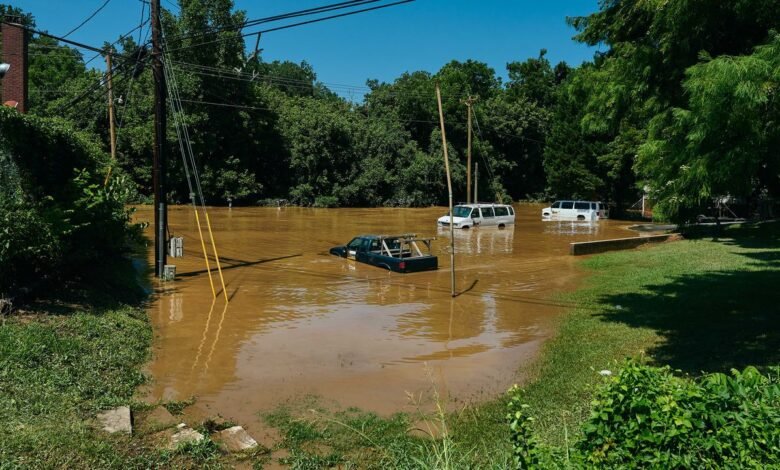Chased by Climate Disaster in North Carolina

Sarah, a woman in her forties living in Pittsboro, in central North Carolina, considers herself a fairly prepared person. “I grew up in West Virginia, way out in the hollers—like, on a farm,” she told me. “I had an outhouse. We got water from a spring.” Her grandparents had immigrated to the United States after the Second World War. They were part of the Dutch resistance to Nazi occupation, and, as a result, they’d developed a survivalist streak. Sarah’s grandmother was used to hiding in remote areas. “She was a foundational part of my childhood, and that kind of spirit is innate in who I am,” Sarah explained. Sarah also instilled the same values in her children, who are now in early adulthood. “My kids are hard core,” she said. “We foraged for wild food, filtered our own water, all that stuff.”
But there are some disasters that even the most equipped people can’t possibly prepare for. Sarah told me that she has recently felt overwhelmed by the frightening weather patterns occurring all over the world as a result of climate change. Beginning on Sunday, July 6th, Tropical Storm Chantal dumped ten inches of rain across sections of central North Carolina. Sarah was out of town pet-sitting for a friend that day. She described watching videos of the storm, many of them on TikTok. Water, Sarah recalled, was “everywhere.” “It’s pouring out all around the businesses, the houses.”
On Tuesday, when she commuted to work, her route took her over Jordan Lake, which had risen thirteen feet above its average level; she also crossed the Haw River, which crested at 32.5 feet, just a few inches shy of the record set by Hurricane Fran, in 1996. Hundreds of roads were closed. While the death toll has not matched the horrific numbers in the Texas Hill Country, which has seen its own historic flooding, several people have died in North Carolina, including two boaters on Jordan Lake, and an elderly woman whose car was swept away by floodwaters in Chatham County.
“The water was up to all the bridges in the lake,” Sarah said. The bridges were also full of debris, which made them seem all the more perilous. “I’m afraid to cross the bridges, if even an inch more rain gets in there,” she explained. Like everyone, she was taken by surprise; Chatham County is not a coastal region, nor is it known for floods. The forecast had shown storms, but she had assumed they would be “like, typical, normal summer storms.” They weren’t.
On Sunday night, Sarah had been especially worried about her daughter, Ellaina, who was back home in Pittsboro, alone. Ellaina had already survived Hurricane Helene, which hit western North Carolina last September, killing a hundred and eight people in the state, with a significant portion of those deaths occurring in Buncombe County. At the time, Ellaina, a college junior, was on campus at Warren Wilson College, which is in the town of Swannanoa. The town was among the hardest-hit parts of Buncombe County; the river there rose to more than twenty-seven feet (four days before Helene, the river had measured less than a foot and a half), and throughout the spring and early summer, the banks were still littered with car parts, the frames of houses, and other detritus left over from the flood.
After the hurricane hit, the students at Warren Wilson found themselves trapped on campus, without water or sufficient food; nonetheless, they took in people from the surrounding area who had lost their homes entirely. There was still power in the dining hall, which ran on a generator, and students would gather regularly at the same time each day to discuss the state of the roads. Eventually, Ellaina managed to find a ride with other students out of Swannanoa; post-hurricane mudslides were wiping away roads as they went, forcing their car to turn around multiple times. That same night, students got word that the nearby Bee Tree dam was breaching, an event that might have overwhelmed the campus with water. (The Bee Tree reservoir provides some of the water supply for Asheville, Buncombe’s largest city and county seat; after Helene, it had the consistency of “chocolate milk,” according to residents.) Students still stranded at the school fled in fear, running in the dark up a hill. The information turned out to be wrong—the dam held—but the terror was real.
Ellaina explained that the experience had left her anxious and struggling to concentrate. She took time off school and moved to Pittsboro, to live with her mom. “It literally felt like everything that my life had ever been got wiped off the map and was covered in, like, toxic flood,” she told me.
Last week, during Tropical Storm Chantal, Sarah remembered a news story from Helene in which a man had managed to reach his kayak and survive the flooding, saving more than ten people in the process. There happened to be a canoe in Sarah’s carport, in Pittsboro. “It’s not silly to go sit in the canoe,” she told her daughter.
As someone who was in Asheville during Hurricane Helene, I am familiar with the dread caused by the sight of rising floodwaters and falling trees. You can only watch helplessly as powerful forces rip apart the ground beneath you. Perhaps most frightening of all is the fact that, in rural areas, such calamity occurs before any official help can arrive. Residents are left to fend for themselves, fighting for their own survival and for the survival of others. In Texas, where flash floods on July 4th swept through Kerr County, destroying an all-girls summer camp called Camp Mystic, there were stories of counsellors shepherding young girls to higher ground.
Part of the tragedy of the Camp Mystic story stems from the fact that the parents were not there. But, often, during these climate events, the burden is almost solely on parents, or perhaps mothers, to protect their children. A survivor’s account published a few days ago in Texas Monthly detailed a horrifying moment when a mother, desperately trying to hold on to her two young children, was unable to save them both. Sarah, a single mother, told me that “this level of crisis” was one that she felt unprepared for. “You realize that life is still on that very sliver edge of the possibility of crisis or no crisis, from something you just can’t control, and you don’t even know if you’re going to get the right information,” she said.
Jessica Calarco, a sociologist and the author of the book “Holding It Together: How Women Became America’s Safety Net,” pointed out that mothers, especially single mothers like Sarah, end up being the front line and sometimes only line of assistance. “In the US, we treat women as our crisis management team,” she wrote to me. “We refuse to implement the kinds of policies or invest in the kinds of protections that would actually keep families safe from threats like those related to climate change.”
Sarah’s sense of ingenuity and self-reliance was hard won. During Helene, her sister’s family, who lived elsewhere in the state, had lost electricity and fled to Florida—which was, of course, then hit by Hurricane Milton. Sarah’s family has been chased around by climate change, and this has altered her view of her role. “It’s about planning, planning for everything you can plan for, right?” she said, but highlighted that an essential part is also “knowing that you can’t plan for everything.” That’s where ingenuity comes in, she explained.
In the aftermath of catastrophic floods, much of this ingenuity also comes from mutual-aid and local groups, the people on the ground best positioned to provide immediate care: everything from food and water to assistance sorting through the debris. I spoke with Devin Ceartas, an organizer with Triangle Mutual Aid, an organization that assisted people during Helene, and during recent disasters in eastern Kentucky and West Virginia. Ceartas, who talked with me as he fielded other calls and dealt with paperwork—he joked via text, “Time to do anything (sleep? eat?) is an absurd concept in these moments”—said that the “heart of the work” right now was helping people whose homes were flooded recover some of their belongings. “I’d say that’s part physical labor,” he added, “and there’s also that need for that sort of emotional labor, like someone has to help these people.”
FEMA, the Federal Emergency Management Agency, is also meant to help with such disasters, though the future of the agency—and federal assistance in times of climate disaster more generally—is uncertain under President Donald Trump, who has previously said that he plans to dismantle the agency altogether. According to other reporting, FEMA’s acting administrator, David Richardson, had not been to Texas and appeared to be missing from key meetings. On Saturday, he joined Texas officials in surveying the damages. Much of the work in Texas, as in North Carolina, has been left to local governments and individuals, a patchwork of private resources, volunteers, and public funding.
As Ceartas pointed out to me, local governments and mutual aid coöperate but do not always have the same processes and interests. He described it as a “cultural difference.” “Mutual aid wants to move very fast and ask few questions,” he said. “Someone shows up and says, ‘I need water.’ You say, ‘How much? Can I help you carry it?’ And the state says, ‘Can we see your I.D.? Are you from town? Is your need related to this disaster?’ ”
Eric Aft, the C.E.O. of Second Harvest Food Bank of Northwest North Carolina, said he relies on local governments, and emphasized the vital part played by government assistance. “When we think about disaster, we have to think about that as collaborative community activities,” he said, adding that “the private sector will never be able to replace what the public sector role, in my opinion, should and has done.” Still, Ceartas stressed the effectiveness of mutual-aid groups, which can move quickly and distribute supplies efficiently; they did so in the aftermath of Hurricane Helene, when groups used warehouses to quickly route aid. “People who own warehouses or empty commercial buildings and stuff everywhere across the United States should get used to the idea of opening it up and handing the keys to a local mutual-aid group when disaster hits,” he said. If Trump defunds or eliminates FEMA, this strategy may indeed be more needed than ever.






